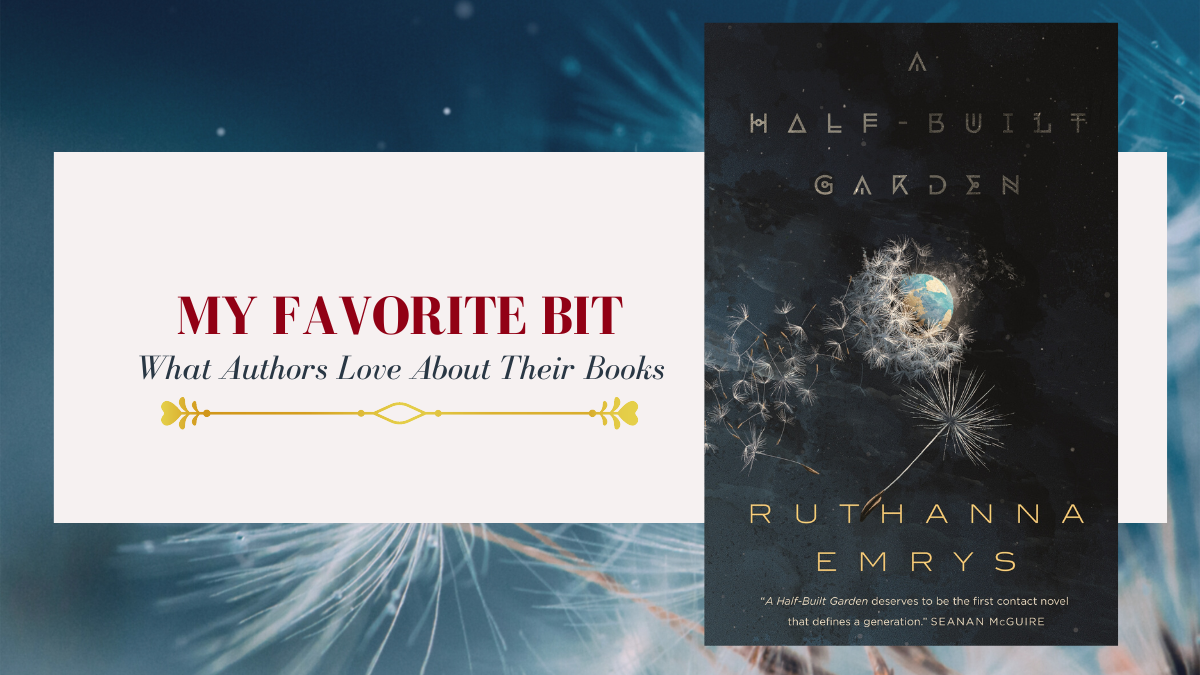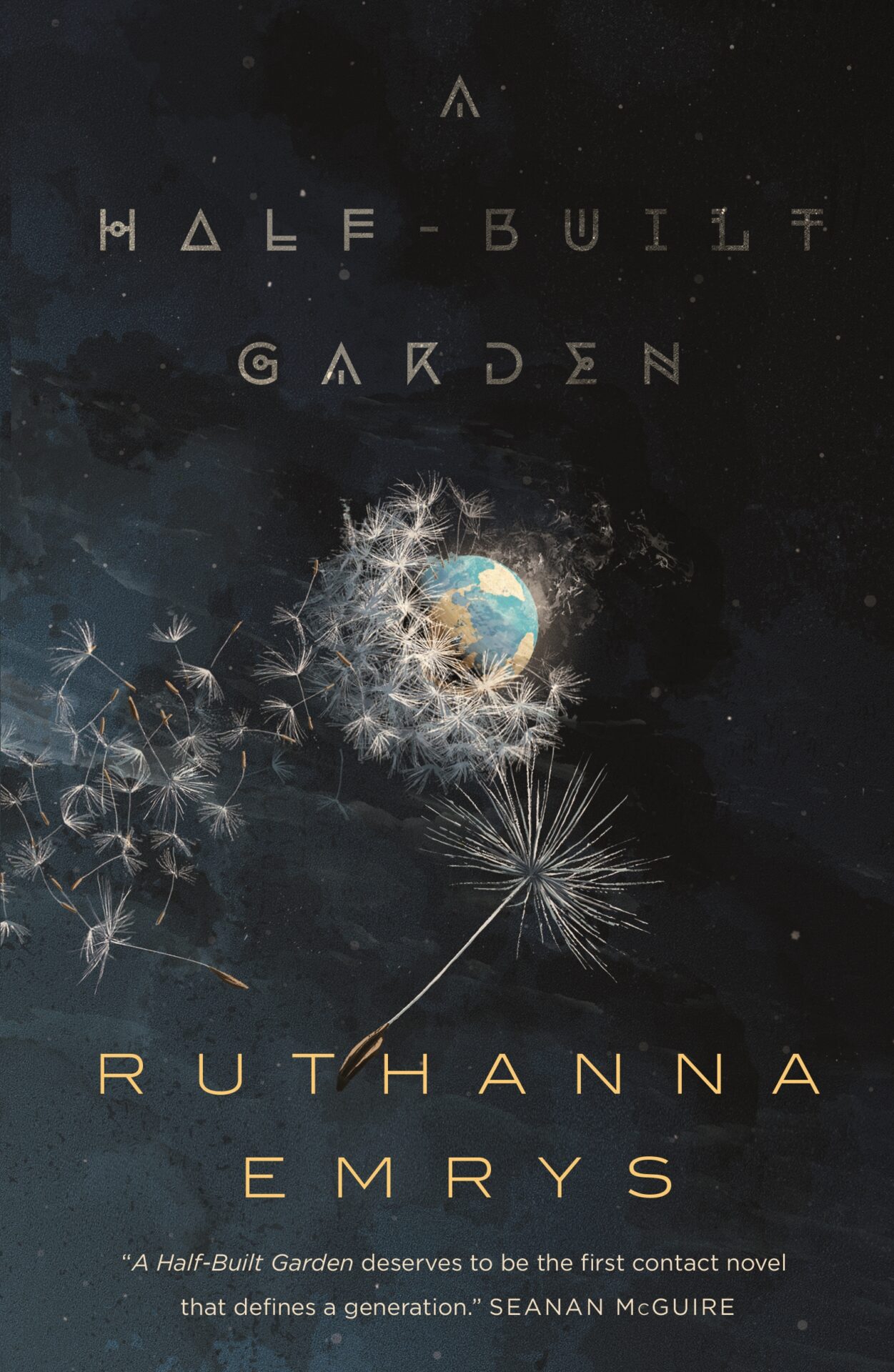
Ruthanna Emrys is joining us today to talk about her novel, A Half-Built Garden. Here’s the publisher’s description:
On a warm March night in 2083, Judy Wallach-Stevens wakes to a warning of unknown pollutants in the Chesapeake Bay. She heads out to check what she expects to be a false alarm—and stumbles upon the first alien visitors to Earth. These aliens have crossed the galaxy to save humanity, convinced that the people of Earth must leave their ecologically-ravaged planet behind and join them among the stars. And if humanity doesn’t agree, they may need to be saved by force.
But the watershed networks that rose up to save the planet from corporate devastation aren’t ready to give up on Earth. Decades ago, they reorganized humanity around the hope of keeping the world liveable. By sharing the burden of decision-making, they’ve started to heal our wounded planet.
Now corporations, nation-states, and networks all vie to represent humanity to these powerful new beings, and if anyone accepts the aliens’ offer, Earth may be lost. With everyone’s eyes turned skyward, the future hinges on Judy’s effort to create understanding, both within and beyond her own species.
What’s Ruthanna’s favorite bit?

RUTHANNA EMRYS
A Half-Built Garden depicts a future where watershed-based decision-making networks have created new forms of governance to address climate change. The main human character is part of the Chesapeake Bay network, and much of the book focuses on her difficulties addressing a problem that the networks were never designed to face: first contact with extremely opinionated aliens.
However, the watershed networks aren’t the only power on Earth. Also vying for control of interstellar negotiations are the institutions they usurped: exiled corporate overlords and the remains of nation-states. It’s understandable that both see first contact as a potential route back to dominance, and a threat to Earth’s future if they succeed. I adore them both.
However, I’m particularly and quietly fond of the remnant U.S. government. I live inside the DC beltway, and have a lot of experience working with executive branch agencies—in fact, one of the major inspirations for Garden was EPA work on crowdsourced sensors for handling watershed runoff. (Sexier than it sounds, I promise!) I’ve seen first-hand the thankless work carried out by career bureaucrats as they push through changing administrations, irregular budgets, public distrust, and right-wing enmity to keep the lights on and the milk safe to drink.
Watching constant efforts to defang the regulations that keep society going, I imagined what could fill the gaps left by that self-imposed loss of governmental power. I thought of this again a couple of weeks ago, when the Supreme Court struck against the EPA’s already-limited ability to address climate change. I still hope we can re-empower the government to protect waterways and air and individual rights, but that’s not the direction we’re going. If this goes on…
The NASA nerds who show up to meet the Ringers are idealists who still want to make government work, generations after it stopped allowing itself to do so. They’re talking to aliens even when they haven’t yet been authorized or budgeted to do so, and quietly negotiating with Congress off-screen in the hopes of getting that backing. Unlike the corporations, they aren’t enemies of the watershed networks. In fact, they often operate under the convenient fiction of “delegating” to those networks the things they can’t manage any longer—but if the world is changing again, they’d like to reclaim some of those authorities.
Viola Saint Julien, who’s binge-watching a century of Star Trek with a new baby when she gets called in for alien duty, is a love letter to every career staffer who’s ever geeked at me about the latest interplanetary probe or shoved aside a stuffed Lorax to make sitting room in their office. Or who’s ever stubbornly told me that it could be worse, even while the president uses their agency for target practice. She doesn’t get the spotlight, but when you catch a glimpse of her snagging Smithsonian artifacts for a “Best of Earth” display or looking for opportunities to quote Shakespeare at extraterrestrials, I hope you think fondly of her ancestors who are hard at work—and equally unappreciated—now.
LINKS:
A Half-Built Garden Universal Book Link
BIO:
RUTHANNA EMRYS is the author of the Innsmouth Legacy series, including Winter Tide and Deep Roots, and the Imperfect Commentaries collection. She writes radically hopeful short stories about religion and aliens and psycholinguistics. She lives in a mysterious manor house on the outskirts of Washington, DC with her wife and their large, strange family. She creates real versions of imaginary foods in her crowded kitchen, gives unsolicited advice, and occasionally attempts to save the world.
